Blood Secrets: Chronicles of a Crime Scene Reconstructionist Read online
Page 2
I didn’t expect to set out on a career path so filled with blood. But, looking back, maybe I should have. As a typical small-town southern kid growing up in the days of Leave It to Beaver and The Andy Griffith Show, I was fascinated by everything related to law enforcement—even when I ended up on the wrong side of it.
Cotton Fields and Cherry Bombs
I grew up in Wall, Texas. The town center was so tiny, you’d miss it if you sneezed while you were driving through—just a school, a post office, a few cotton gins, and a handful of stores, most of which are now abandoned. To me, it was home and I loved it. But to most people, it was nothing more than miles and miles of sprawling cotton farms like the one where I was raised.
Everybody picked cotton when I was a kid. School gave us a week off in the fall because so many of us had to help pick cotton on our families’ farms. I remember the scrape the sacks made as they dragged behind me through the fields and the sting of bleeding hands when I tried to pick the sharp-edged bolls without gloves. We went to school barefoot when the weather was warm in those days, and the land was so flat that gazing out the classroom window, I could see my family’s farm house four miles away.
Every year seasonal workers showed up at our door, many of them African-American and Hispanic, to help pick our cotton. The one I remember best was Earl Lee Cook. As kids, we called him “Early” Cook. Early was among the most polite men I’ve ever met, but he stuttered so badly that getting a sentence out looked like pure torture.
If my little brother, Mickey, and I were ever tempted to make fun of Early, my father set us straight. Dad treated everyone with respect and dignity, and he made sure we did the same.
That attitude was somewhat unusual in Texas in the 1950s. There were a lot of people who took the opposite view, especially when it came to the workers on their farms. Whenever rumors started buzzing around that the immigration authorities were moving in—and they often did—more than one local farmer suddenly found an excuse not to get around to paying his workers. The “wetbacks” will soon be gone, they figured. If their wages run a little short, so what? What can they do about it? Why not save a little cash at someone else’s expense?
My dad did the reverse. He made a point to pay every Mexican worker as soon as he got wind of the rumors, before immigration swooped in.
I learned a lot from my father. He taught us to treat people with compassion but never condescension. Those lessons have served me well throughout my life and my career as a police officer and a crime scene investigator.
The other person who taught me a lot was my cousin Ralph. He was six years older than me, and he was my idol. When Ralph became a baseball fanatic and set his sights on making it as a professional ballplayer, so did I. I filled my room with baseball paraphernalia and my head with dreams of pitching under the bright lights of the major leagues. Then when Ralph blew out his arm while training for the Cleveland Indians and joined the air force, I announced my plans to enlist, too. I was crushed when the National Guard broke the news that I’d have to wait to sign up until I got out of high school.
There I was, stuck on the farm hunting rabbits and raising pigs for 4-H ribbons, while Ralph headed off on grand adventures I could only imagine. The year he left, I turned twelve—old enough in Texas back then to get my driver’s license, which I did. By the time I was fourteen, I was experienced enough behind the wheel to land a job driving a dump truck for the county whenever I wasn’t in school, helping my dad out with the farm animals, or hauling grain with our 1946 Ford pickup.
But there was a drought around that time, and like many farm families in the area, ours ended up heavily in debt. I remember my mom and dad sitting at the kitchen table, faces taut and worried, discussing the enormous amount we owed—$10,000, which sounded like all the money in the world to me back then—and racking their brains for a way we could scrape together enough to pay it back. There was a lot of talk among the men of Wall about building an irrigation system and digging canals. Rather than wait for that plan to come to fruition and save the day, Dad got a second job driving cars for Goodyear on a high-speed track in the countryside nearby, testing their tires to see if they’d pass muster on the highway. They tested all kinds of tires there; I used to like to stand inside the colossal wheel wells of the tires used on mining equipment—massive tires fit for a giant’s wagon. To be closer to Dad’s second job, we moved twelve miles down the road, from Wall to the outskirts of San Angelo. Dad still drove back to Wall every day to tend the farm, and we often went with him.
With a population of seventy-five thousand, San Angelo seemed like a major city compared with Wall. On my first day as a junior at Lakeview High School, I remember thinking that I’d have a huge graduating class—forty kids—compared with Wall’s sixteen, augmented now and again by an occasional migrant worker’s child. We’d been driving to San Angelo to go to church all my life, so I already knew a few of my Lakeview classmates from youth group, including Jim Newsom, who would become my best pal and a lifelong friend. Still, everything seemed new and exciting. One day shortly after we arrived, a short, skinny boy named Martin Mosely showed up in the school parking lot and popped open the trunk of his car to reveal a bulging feed sack.
I joined a cluster of my classmates peering down curiously at it.
“Whatcha got in there?” someone asked.
Martin grinned and plunged a catcher’s stick deep inside the bag, then drew out a long, shiny black object.
“Get that thing away from me!” cried the boy standing closest to him, stepping backward hurriedly and bumping into the people behind him.
“Rattlesnakes!” Martin announced proudly, opening the bag to reveal at least fifteen hissing reptiles coiled in the bottom of the dusty bag.
“What do you do with them?”
“Make belts out of ’em and sell ’em,” he explained, describing how he drove to the outskirts of town and combed the hillsides for rattlers’ dens. When he found one, he gassed the snakes inside to make them woozy and nonaggressive, then used the catcher’s stick to scoop them into a bag. Later he would skin them, turning their hides into belts and their heads into buckles. The rattlers he used as embellishments for western hats.
Like everything else in San Angelo, football was different. I had played six-man football in Wall, but here at Lakeview they had a full team. This being Texas, every self-respecting male student wanted to be a part of it, so I tried out and ended up playing halfback. My dad spent all day farming, then headed straight to the track to drive until ten P.M. on weeknights, which meant that he never made it to my games. He didn’t say anything to me about them, not even when I made a touchdown, but Mom assured me that he listened to every one on the radio while he worked.
When I wasn’t playing football or baseball, running track, or studying, I was helping on the farm. On Sundays, mornings started with mass at the local Catholic church with my dad and ended with services and youth group at the local Protestant church with my mom.
Still, I managed to find time to get bored and cause trouble as a teenager. Our whole community was German-Catholic, which meant beer drinking was part of everyday life for us. Even my grandparents drank it. Nobody looked askance at a seventeen-year-old with a glass of beer. But getting caught sneaking cigarettes—which I did—got you a tongue-lashing and worse.
One dry and dusty summer day after my junior year, I hit upon a memorable way to liven things up in town for my friends and me. I convinced them it would be a bright idea to toss a cherry bomb into a little bar at the edge of town, a place notorious as a watering hole for the local drunks. I rounded up some friends—three girls and two guys—to pile into my pal Nelson Word’s 1952 Mercury. The plan was for Nelson to pull up near the bar’s front entrance and keep the Mercury running while I hopped out, yanked open the door, and chucked the firecracker inside.
The bar was housed in a narrow building about ten feet wide—long and low and dark—and when the cherry bomb exploded, it let off an eardrum-s
hattering bang! It literally shook the rafters.
As the sounds of panicked shouts and screams rose from inside the bar, we doubled over laughing uproariously—failing to notice that the bar’s owner was standing nearby openmouthed, staring at us and still clutching the bulging trash bags he’d been emptying into bins in the parking lot. Nelson, our getaway driver, hit the gas and off we sped as the enraged owner raced to his pickup truck.
No sooner had we rounded the corner on our getaway than the engine gave a raspy mechanical cough and died. Nelson was trying desperately to restart it when the pickup roared past us and screeched to a halt inches from our fender, penning us in. The owner of the bar jumped out, slammed his door, and stalked over. By the look on his face, he hadn’t found the cherry bomb nearly as hilarious as we had.
He marched us back to the street in front of the bar, where things were still in an uproar thanks to the cluster of staggering, slurring patrons who had stumbled out, all convinced someone had fired a gun and all hotly debating exactly what had gone down.
“I’m tellin’ ya, Mary shot John!”
“Naw, you’re way off. It was John who shot Mary!”
Ignoring them, the owner ordered us to wait while he called the cops.
The next thing we knew, we were en route to the local police station. As we pulled to a stop in front of the civic auditorium, which housed police headquarters in its basement, I thought wistfully back to the last time I’d been here. That afternoon I’d been elbowing my way to the front of a crowd of mesmerized San Angelo residents standing on the sidewalk, gaping at a young Elvis Presley as he stepped out of a gleaming pink Cadillac. He flashed his trademark whiplash grin, then headed inside to warm up for a concert he was giving that night, leaving the air filled with lively chatter.
Today the place was a stark contrast—silent and somber. You could hear a pin drop as we marched down the steps, past the dispatcher and the drunk tank, all of us trembling silently at the thought of what our parents would do when they found out we’d been hauled in by the cops. I was calculating just how mad my dad was likely to be and how badly I’d be punished when the scene in front of me snatched those worries completely out of my head.
I was standing in the middle of one of the most fascinating places I’d ever seen. Every wall was lined with posters and pictures, many bearing faces of menacing-looking criminals glaring defiantly at the camera over descriptions of their crimes. I squinted to read the details. Rumpled drunks peered curiously out at us from between the bars of their holding cells. All around us, officers were busy at work on important-looking jobs, hunched over their desks, filing reports, jotting down notes as they listened to callers. A sign indicated that the detectives’ bureau lay just down the hall, out of sight. While my friends hung their heads and waited morosely, I stared around wide-eyed, taking everything in. So what if I was on the wrong side of it all? This place was amazing.
On the way home, as my dad reprimanded me for my stupidity, I nodded silently, only half hearing, still mesmerized by the police station.
Murder in the Junkyard
Another incident from a different summer would also shape my future, though I didn’t know it at the time. It began with football.
We were all football crazy when I was a teenager, and knowing I would want to go out for the team in San Angelo, I set out to find a job that would help me bulk up the summer we moved. Thanks to a friend of my dad’s, I got work at the Acme Iron & Metal Company junkyard. It was an enormous, rambling place with acres and acres of smashed cars in towering stacks and mounds of scrap metal as tall as buildings. The work was hot, filthy, and backbreaking. Day after day I lugged huge chunks of greasy, broken-down chassis, rolled heavy barrels, and cleaned insulation off copper. By the time I headed home, my arms were always black and coated in flecks of broken glass.
The guy in charge of the junkyard was called Red, and the men he hired were a rough crowd. When someone didn’t show up for work, odds were pretty good that he had landed in jail. Their talk was as colorful as it was cuss-laden, and listening to their stories made me feel as if I had landed in the middle of a crew of pirates. I was the only kid working there, but they all treated me fairly and decently. One of my favorite co-workers was a big, rowdy African-American guy named George.* He was jovial, loudmouthed, foulmouthed, and tough as nails.
One day I showed up to work to find several members of the San Angelo Police Department surrounding an old beater of a pickup parked on the truck scales near the junkyard’s entrance. I walked over to Joe,* one of my co-workers, who was ripping usable parts out of a rusted sedan, acting as if he hadn’t even noticed the cluster of cops nearby.
“What happened over there?” I asked him.
Joe glanced in the direction I was pointing and wiped sweat off his forehead with the back of his hand. “George and the guy drivin’ that pickup got in a fight,” he told me. “George shot him.” He said it so casually, you would have thought things like that happened at work every day.
“Shot him?” I gasped. “Is he dead?”
“I reckon he is. He got shot in the head, close up.” Joe said the authorities had carted off both George and the dead man less than an hour ago. When I had pestered him with all the questions I thought he could tolerate without losing his temper, I forced myself to get down to work. The slam of doors and the sound of an engine starting a short while later told me the police were leaving.
I tried to concentrate on the copper I was cleaning, but I couldn’t resist glancing over at that abandoned pickup every few minutes. Back in those days, nobody put yellow tape around the crime scene—at least not for a crime like this one. No lab coat–clad team of forensic technicians was prepping to comb the vehicle with an armload of fancy equipment. No gaping onlookers or nightly news crews were buzzing around. No tow truck showed up to haul it away. It just sat there like the rest of the battered, rusted cars and trucks that littered the Acme junkyard.
I kept thinking about the pickup, wondering what it looked like inside. Finally, I dropped what I was doing and went to get a closer look. I walked cautiously over and edged up close enough to see into the empty driver’s seat with its open windows. Blood, blackish red and dried by that time, was smeared all over the seat back on the driver’s side.
A strange feeling came over me as I stood there gawking at it, unable to move away. Somebody had been shot in there. Somebody had died sitting right in that spot, less than a foot away from where I was standing. I felt horrified. But at the same time, I was utterly mesmerized. Dozens of questions started bubbling up in my mind. Who was the murdered man? Where did he come from? What was his story? Did he and George know each other? What did he say to George to provoke him? Did the argument start over the price of scrap metal? What kind of gun did George use? How close was he when he pulled the trigger? I wanted to know everything about the murder.
I thought about that blood for a long time. Even today, I get the same feeling in my bones when I’m working a challenging case. I’m still just as fascinated, just as relentlessly intent on finding out every how and why of the crime.
Law and Disorder
One spring a few years later, my father and I were back in Wall helping my uncle Alois tend his garden when Dad asked, “So, have you heard from Ralph lately?”
My uncle took a break from his digging. “He’s out of the air force now,” he told us. “He just became an officer in the San Angelo Police Department.”
Ralph, my role model, was a cop? While my dad and my uncle discussed Ralph’s new job, scenes from my brief brush with the law rolled through my mind—posters of escaped felons, drunks in holding tanks, ringing phones, important-looking people hurrying around doing important-looking work.
Forget baseball. Forget the military. I went home that evening, my head filled with images of myself in uniform catching bad guys and keeping the streets safe for ordinary citizens. A new career goal was fast taking shape in my mind. I wanted to be a cop.
R
alph soon discovered my fascination with his job and offered me a ride-along. After that, I became a frequent passenger while he was on duty.
One summer night when I was about eigh teen, I was riding through town with Ralph in his patrol car when a call came in that two suspects had been apprehended outside a local beer ware house. He turned the car around and we headed to the address immediately.
By the time we arrived, several other officers were already on the scene, surrounding a pair of men who were lying facedown on the ground in cuffs near a converted Quonset hut. One was shirtless and had been locked in thumbcuffs, a contraption I’d never seen before.
I felt like a spellbound kid watching an action flick. Here were two real, live bad guys—burglars who had broken into the cavernous metal dome and were obviously planning to steal the cases and kegs inside it. Their empty pickup truck was parked nearby, ready to be loaded up with beer. Fortunately, the good guys had arrived in the nick of time to nab them, just as in any cops-and-robbers drama.
Ralph was starting to ask what had happened when the rumble of tires on gravel interrupted him. We turned and spied the unmistakable Studebaker Lark of local police chief Melvin James pulling up.
The door swung open and out stepped James, clad as always in his trademark western hat and string tie.
Without waiting for his officers to fill him in on the details, he strode up to the shirtless man on the ground and looked down at him disdainfully. Then he drew back his heel and kicked the man in the face.
No one said a word.
James kicked him again. Then again. He kept kicking him until blood was pouring out of the man’s nose and mouth onto the ground around him. Finally, he wedged his boot under one bloodied shoulder and flipped the man onto his back. The suspect lay there, helpless, blinking up through the blood.

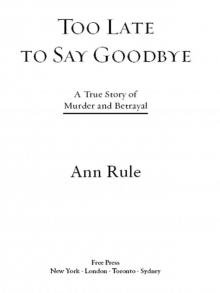 Too Late to Say Goodbye: A True Story of Murder and Betrayal
Too Late to Say Goodbye: A True Story of Murder and Betrayal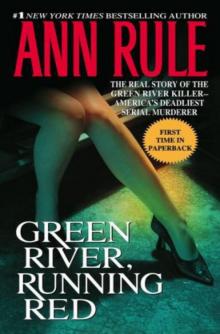 Green River, Running Red
Green River, Running Red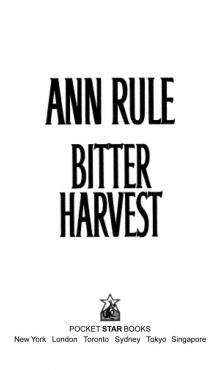 Bitter Harvest
Bitter Harvest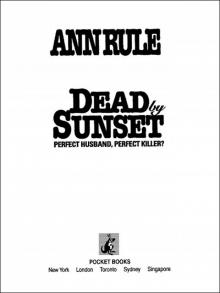 Dead by Sunset: Perfect Husband, Perfect Killer?
Dead by Sunset: Perfect Husband, Perfect Killer?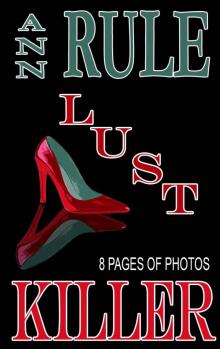 Lust Killer
Lust Killer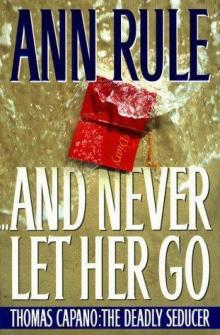 And Never Let Her Go: Thomas Capano: The Deadly Seducer
And Never Let Her Go: Thomas Capano: The Deadly Seducer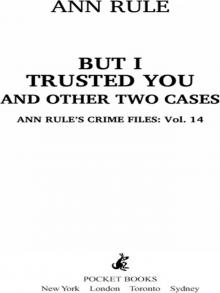 But I Trusted You and Other True Cases
But I Trusted You and Other True Cases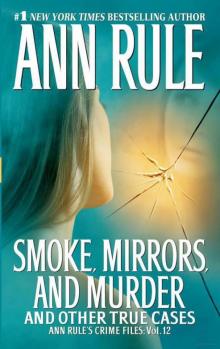 Smoke, Mirrors, and Murder and Other True Cases
Smoke, Mirrors, and Murder and Other True Cases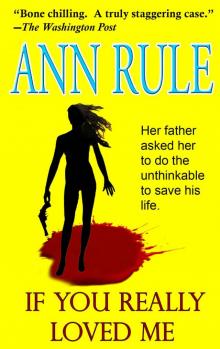 If You Really Loved Me
If You Really Loved Me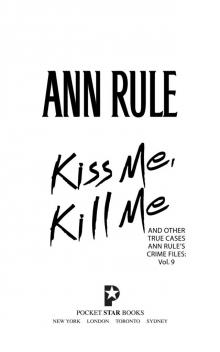 Kiss Me, Kill Me and Other True Cases
Kiss Me, Kill Me and Other True Cases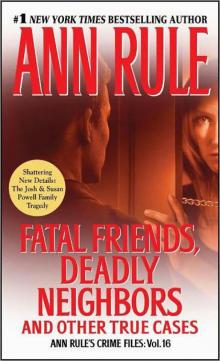 Fatal Friends, Deadly Neighbors and Other True Cases
Fatal Friends, Deadly Neighbors and Other True Cases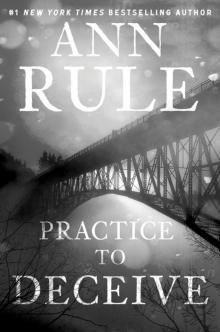 Practice to Deceive
Practice to Deceive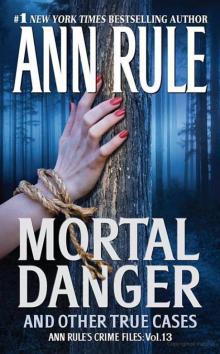 Mortal Danger and Other True Cases
Mortal Danger and Other True Cases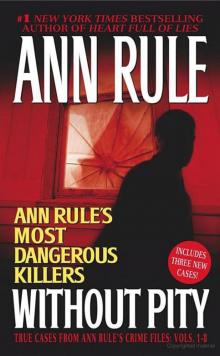 Without Pity: Ann Rule's Most Dangerous Killers
Without Pity: Ann Rule's Most Dangerous Killers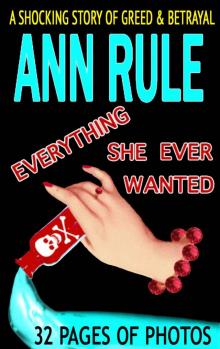 Everything She Ever Wanted
Everything She Ever Wanted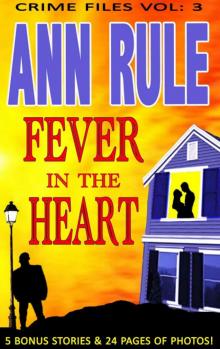 A Fever in the Heart and Other True Cases
A Fever in the Heart and Other True Cases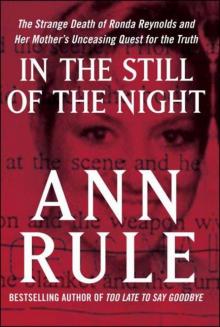 In the Still of the Night
In the Still of the Night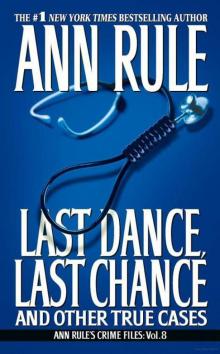 LAST DANCE, LAST CHANCE - and Other True Cases
LAST DANCE, LAST CHANCE - and Other True Cases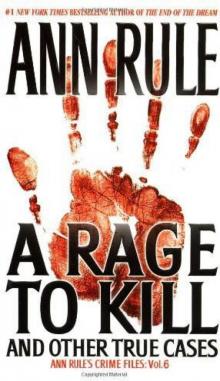 A Rage to Kill
A Rage to Kill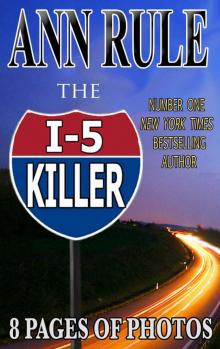 The I-5 Killer
The I-5 Killer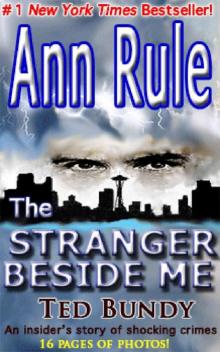 The Stranger Beside Me
The Stranger Beside Me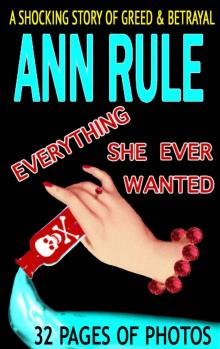 Everything She Ever Wanted: A True Story of Obsessive Love, Murder, and Betrayal
Everything She Ever Wanted: A True Story of Obsessive Love, Murder, and Betrayal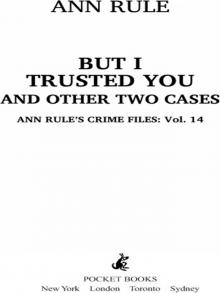 But I Trusted You
But I Trusted You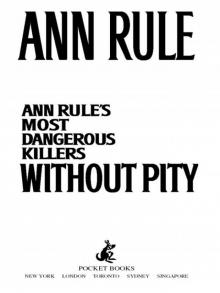 Without Pity
Without Pity Kiss Me, Kill Me
Kiss Me, Kill Me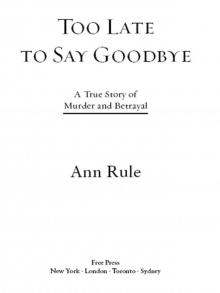 Too Late to Say Goodbye
Too Late to Say Goodbye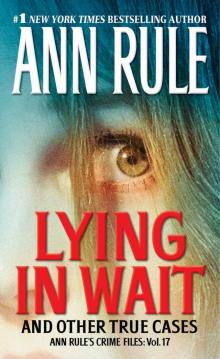 Lying in Wait
Lying in Wait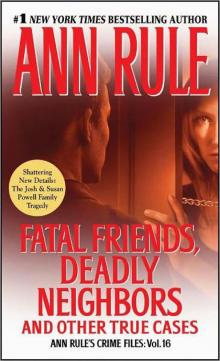 Fatal Friends, Deadly Neighbors
Fatal Friends, Deadly Neighbors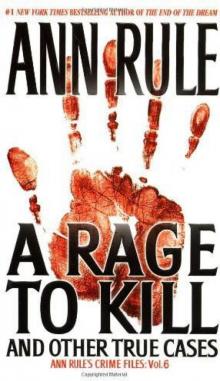 A Rage to Kill: And Other True Cases
A Rage to Kill: And Other True Cases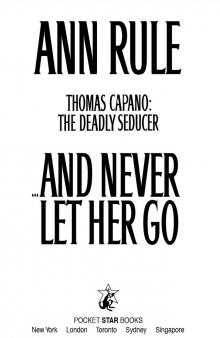 And Never Let Her Go
And Never Let Her Go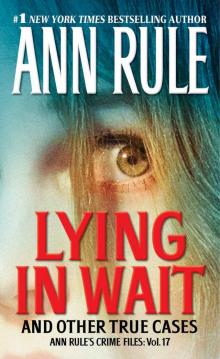 Lying in Wait Ann Rule's Crime Files Vol.17
Lying in Wait Ann Rule's Crime Files Vol.17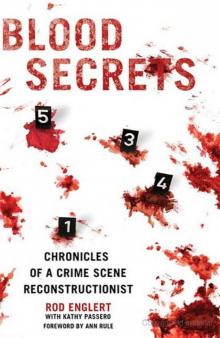 Blood Secrets: Chronicles of a Crime Scene Reconstructionist
Blood Secrets: Chronicles of a Crime Scene Reconstructionist No Regrets
No Regrets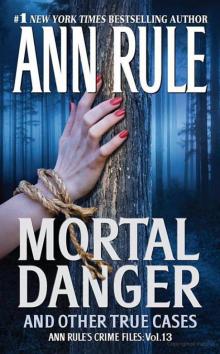 Mortal Danger
Mortal Danger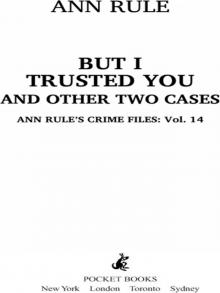 But I Trusted You: Ann Rule's Crime Files #14
But I Trusted You: Ann Rule's Crime Files #14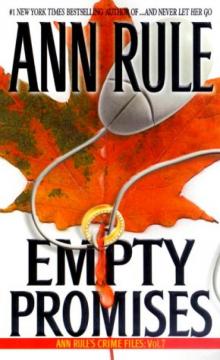 Empty Promises
Empty Promises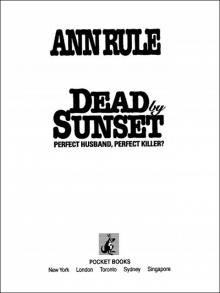 Dead by Sunset
Dead by Sunset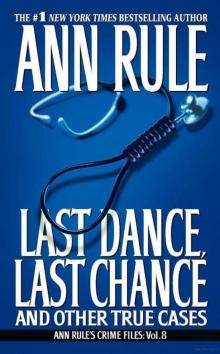 Last Dance, Last Chance
Last Dance, Last Chance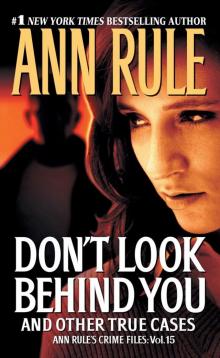 Don't Look Behind You
Don't Look Behind You